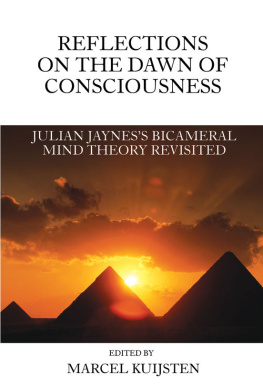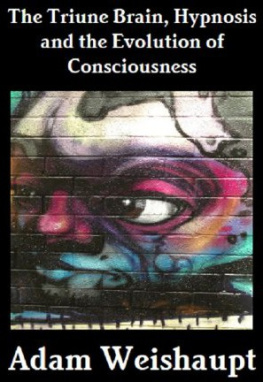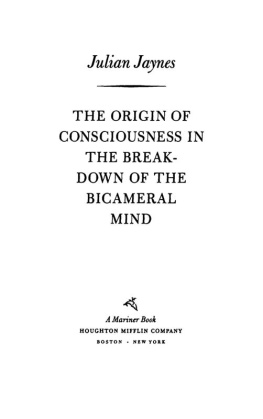Praise for Reflections on the Dawn of Consciousness
Reflections on the Dawn of Consciousness is an accessible re-introduction to Julian Jaynes, whose wondrous and wonderful The Origin of Consciousness in the Breakdown of the Bicameral Mind first brought to public awareness the invisible mansion of all moods, musings, and mysteries the introcosm that is consciousness.
Richard M. Restak, Clinical Professor of Neurology
George Washington Hospital University
School of Medicine and Health Sciences
Blending biography with analytical and critical discussions and evaluations, this volume presents a rounded picture of Jaynes as an individual and scholar, while not shrinking from controversial and difficult issues. It is hoped that this volume will help clarify misunderstandings and stimulate the continuing pursuit of consciousness in the Jaynesian spirit.
Klaus J. Hansen, Professor Emeritus of History
Queens University, Ontario, Canada
An indispensable resource for ideas on consciousness, religion, and theory of ancient civilizations. Includes various authors including some important but lesser known articles by Julian Jaynes himself. Interdisciplinary, insightful, provocative, in the original spirit of Jaynes seminal work, The Origin of Consciousness in the Breakdown of the Bicameral Mind , but goes well beyond mere support and evidence of that work. Contains profuse notes and bibliographies for each article.
John Hainly, Dept. of Philosophy
Southern University
Reflections on the Dawn of Consciousness explains, extends, and expands many of Julian Jayness most provocative ideas. For readers who finished The Origin of Consciousness in the Breakdown of the Bicameral Mind and wondered What comes next?, this collection provides answers. Gathering together both additional writings by Jaynes himself, along with thoughtful essays by scholars from a wide range of disciplines, the book both explores ways in which Jayness thought can be applied in specific fields of study and serves as a testimony to the centrality of the issue of consciousness to all fields of intellectual endeavor. This worthy sequel to Jayness original book has been a long time coming, but the wait has been worth it.
Ted Remington, Assistant Professor, Dept. of English and Foreign Languages, University of Saint Francis
This is a beautifully arranged tribute to Jaynes with a broad mix of contributions about aspects of his theory. In new and convincing linguistic evidence, Chinese characters evolve in form and meaning as the ritual for accessing ancestral voices devolves from serene personators to frenzied shamans to drunken revelry.
Carole Brooks Platt, Ph.D.
Independent scholar
A book which after 30 years and in light of new research and ideas, introduces again Jayness theory to a scientific world that, now, may be ready to accept it.
Roberto Bottini, Dept. of Human Sciences
University of Bergamo , Italy
Reflections on the Dawn of Consciousness
REFLECTIONS
ON THE DAWN OF CONSCIOUSNESS
JULIAN JAYNESS BICAMERAL
MIND THEORY REVISITED
Edited by
Marcel Kuijsten
Julian Jaynes Society
Copyright 2006 by Marcel Kuijsten
All rights reserved. No part of this book may be reproduced or utilized in any form or by any means, electronic or mechanical, including photocopying, recording, or by any information storage or retrieval system, without permission in writing from the publisher. Inquires should be sent to the Julian Jaynes Society, e-mail: info@julianjaynes.org.
First Julian Jaynes Society Kindle Edition 2013
Publishers Cataloging-in-Publication Data
Kuijsten, Marcel
Reflections on the Dawn of Consciousness: Julian Jayness Bicameral Mind Theory Revisited
Includes bibliographical references and index.
1. Consciousness. 2. ConsciousnessHistory. 3. Psychology.
ISBN: 978-0-9790744-0-0 (hc.)
ISBN: 978-0-9790744-1-7 (pbk.)
Library of Congress Control Number: 2006936708
Printed in the United States of America
Cover design by Marcel Kuijsten.
Cover photograph by Glen Allison/Getty Images.
Back cover photograph by George Dunbar.
Back cover illustration by Julian Jaynes (see Chapter 12).
Julian Jaynes Society
Henderson, NV
julianjaynes.org
CONTRIBUTORS
MICHAEL CARR retired from teaching at Otaru University of Commerce in Japan and established a translation company in Hawaii. He has published extensively on Chinese and Japanese linguistics and lexicography, including the New Japanese-English Character Dictionary .
SCOTT GREER is Associate Professor and Chair of the Department of Psychology at the University of Prince Edward Island. He is also Editor for the Canadian Psychological Association journal, the History and Philosophy of Psychology Bulletin, and is coordinator for the Julian Jaynes Conference on Consciousness. Dr. Greer has published over a dozen articles on the history and theory of psychology, with particular emphasis on the history of self research and psychoanalysis.
JOHN HAMILTON retired as Director of Psychology from Gracewood Hospital, the original Georgia facility for the mentally and physically handicapped. Presently he works with Katherine Sturm, therapist, in a research and education project specializing in interpersonal relationships.
JULIAN JAYNES (19201997) is author of the influential and controversial book The Origin of Consciousness in the Breakdown of the Bicameral Mind . He taught psychology at Princeton University from 1966 to 1990, lectured widely, and published numerous academic articles.
MARCEL KUIJSTEN is Founder and Executive Director of the Julian Jaynes Society. He received his bachelors degrees in Psychology and English from California State University and his MBA from the University of Nevada, Las Vegas.
JOHN LIMBER is an Associate Professor in the Department of Psychology at the University of New Hampshire where he teaches and investigates topics relating to language, consciousness, and the evolution of primates.
BRIAN J. MCVEIGH teaches in the East Asian Studies Department at the University of Arizona. He has written seven books and researched nationalism, bureaucracy, historical psycholinguistics, education, gender, religion, and linkages between psychology and material culture.
MICHAEL A. PERSINGER is Professor of Behavioral Neuroscience in the Biomolecular Sciences Program at Laurentian University. During the past 40 years he has been investigating the relationship between brain structure and behavior by exposing rodents and human beings to weak, physiologically-patterned magnetic fields. He has published more than 200 technical articles in refereed journals and written six books.
JAN SLEUTELS is Assistant Professor of Philosophy at Leiden University. His teaching and research interests range from metaphysics to philosophy of mind and cognitive science. He is currently working on a large project in media philosophy.
DAVID C. STOVE (19271994) taught philosophy at the University of Sydney from 1960 to 1987. He published books on the philosophy of science and on Darwinism as well as numerous academic and controversial articles. His views were atheist and conservative, his style biting.
JUNE F. TOWER and her husband, Walter Tower, were neighbors and friends of Julian Jaynes and his family.
WILLIAM R. WOODWARD took his masters in psychology with Julian Jaynes at Princeton in 19671969. His Ph.D. comes from Yale in history of science and medicine. He has published articles on scientific biographies of many psychologists and co-edited four books. He teaches international, ethnic, and political psychology from an historical perspective.
FOREWORD
The understanding of ourselves and the universe in which we exist has progressed by conceptual increments from the intuitive subjective experiences of specific people. There was Copernicus who removed the human from the center of the universe and Darwin who replaced the explanation of mankinds special creation with a biological process of evolution. Julian Jayness theories for the nature of self-awareness, introspection, and consciousness have replaced the assumption of their almost ethereal uniqueness with explanations that could initiate the next change in paradigm for human thought.
Next page










